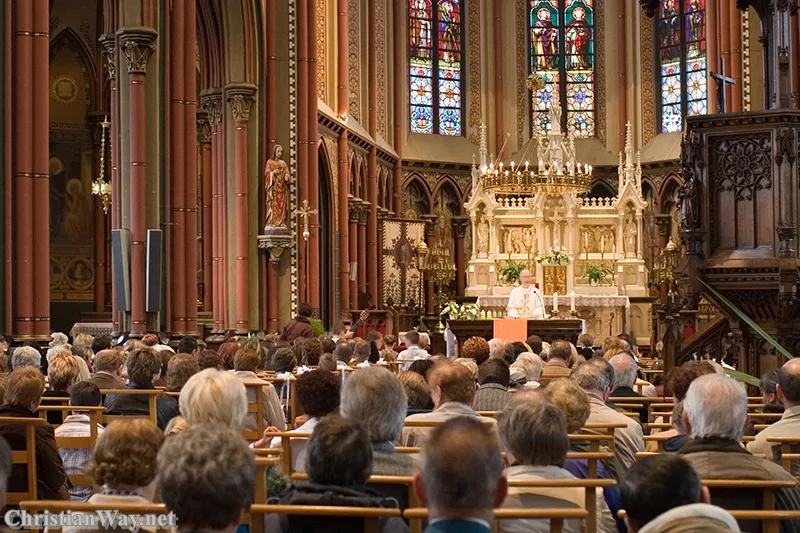Dear friends in Christ,
Every human heart, whether it knows it or not, yearns for love — not a fleeting affection, not a moment of pleasure or sentiment, but that deep and abiding love which gives life meaning. We may search for it in friendship, in marriage, in service, or in our pursuits, yet all these forms are but reflections of a greater source. At the very center of the Christian faith lies a truth so profound and yet so simple: God is love (1 John 4:8). Everything we believe, everything we do, everything we hope for — finds its root in that eternal declaration.
Christian love is not an abstract idea or a noble moral effort. It is the living presence of God’s own Spirit within us, shaping our hearts to love as He loves. To speak of Christian love, therefore, is to speak of the mystery of God Himself — of the Father who creates, the Son who redeems, and the Holy Spirit who sanctifies. It is to enter the rhythm of divine life, where self-giving is joy, forgiveness is strength, and compassion is the mark of holiness.

Let us then journey together into the heart of this mystery — to understand what Christian love truly is, how it manifests in our lives, and how it becomes the very sign of God’s kingdom on earth.
Love as the Revelation of God’s Nature
When St. John wrote, “God is love,” he was not describing an attribute among many, but revealing the essence of who God is. Every act of God — creation, covenant, incarnation, redemption, resurrection — flows from His eternal love. Before the world began, before sin and death, before time itself, God was love — Father, Son, and Holy Spirit, united in perfect communion.
To know God, then, is not merely to understand His laws or His power, but to enter into His love. Jesus said to His disciples: “As the Father has loved me, so have I loved you; abide in my love” (John 15:9). Notice how personal that is. It is not an invitation to study or admire love from afar, but to abide in it — to dwell, to rest, to live within its embrace.
The Cross: The Measure of Love
The purest image of divine love is not found in grandeur or glory, but in the cross of Christ. There, love takes on flesh and blood, pain and surrender. “Greater love has no one than this, that someone lay down his life for his friends” (John 15:13). On the cross, God’s heart is laid bare — not as a symbol of defeat, but as the triumph of mercy.
Christian love, therefore, is not sentimentality. It costs. It gives itself entirely for the good of another. It forgives when it is wronged, blesses when it is cursed, and prays even for its enemies. Such love is not humanly possible on its own; it is divine love poured into our hearts through the Holy Spirit (Romans 5:5).
Love Beyond Emotion
Modern culture often equates love with feeling — a warmth of heart or attraction of desire. But Christian love, or agape, goes far deeper. It is a choice, a disposition of the will, an orientation toward the good. It seeks not to possess but to serve; not to be loved, but to love.
St. Thomas Aquinas defined love as “to will the good of the other.” In this light, even when emotion fades, love can endure, for it is rooted in truth, not in mood. It remains faithful, patient, and steadfast — because it mirrors the constancy of God Himself.
Love Manifested in Christ
If we wish to know what love looks like, we have only to look at Jesus. Every gesture, every word, every act of His life reveals love in action.
Love That Heals and Restores
Jesus’ compassion was not theoretical; it reached into the wounds of the world. He touched lepers, spoke with outcasts, forgave sinners, and wept with the sorrowful. He loved those whom society rejected. He saw each person not by their failure, but by their dignity as children of God.
When He healed the blind and raised the dead, it was not merely to display power, but to restore communion — to bring those separated by suffering back into the embrace of life. Christian love continues this mission today whenever we lift up the broken, console the grieving, or walk beside the lonely.
Love That Forgives
On the cross, Jesus prayed, “Father, forgive them, for they know not what they do.” Here is the summit of divine love — mercy that refuses to retaliate. To love as Christ loves means to forgive even when forgiveness seems impossible. It means to renounce vengeance, to pray for those who hurt us, and to trust that mercy is stronger than hatred.
This forgiveness is not weakness. It is victory — the victory of grace over sin, of light over darkness. Every time we forgive, we open a door for God to work in human hearts, beginning with our own.
Love in the Life of the Believer
Christian love is not confined to the sanctuary; it is meant to infuse every corner of our lives. St. Paul describes it beautifully in 1 Corinthians 13 — “Love is patient and kind; love is not jealous or boastful; it is not arrogant or rude. It does not insist on its own way; it is not irritable or resentful.”
Love in Family and Friendship
Our first school of love is the home. Parents who sacrifice for their children, spouses who forgive and persevere through hardship, friends who remain loyal in times of trial — these all bear the marks of divine love.
Christian family life, when rooted in charity, becomes a living reflection of the Holy Trinity: a communion of persons bound together not by convenience, but by gift. The smallest acts — a word of kindness, a gesture of patience, a quiet act of service — are sacraments of love, invisible yet powerful.
Love in the Community of Faith
In the Church, love is not optional; it is the very air we breathe. Jesus said, “By this all people will know that you are my disciples, if you have love for one another” (John 13:35). This love transcends differences of culture, race, and opinion. It unites sinners and saints, rich and poor, learned and simple.
When we worship together, forgive each other, and share our burdens, the Church becomes what she truly is — the Body of Christ, alive with the love of its Head.
Love in the World
Christian love is not meant to remain enclosed within church walls. It sends us into the world as witnesses of hope. Every act of charity, every defense of human dignity, every moment of compassion in a divided world proclaims the Gospel without words.
The saints understood this well. Mother Teresa once said, “Not all of us can do great things, but we can do small things with great love.” Christian love transforms the ordinary — a smile, a meal shared, a listening ear — into a participation in God’s own tenderness.
Love and the Challenge of the Cross
True love will always bring us to the cross. To love in a world marked by selfishness is to risk misunderstanding, rejection, even suffering. Yet this is the narrow path that leads to life.
Jesus tells us, “If anyone would come after me, let him deny himself, take up his cross daily, and follow me.” (Luke 9:23). The cross is not only His burden — it is the form of every Christian life. When we love sacrificially, we unite our pain with His redeeming love, and through it, souls are saved, hearts are changed, and grace is poured out upon the world.
To love as Christ loves is to believe that no act of kindness is wasted, no suffering offered in love is meaningless. Love gives value to all things; without it, even the greatest works are empty.
The Holy Spirit: The Source of Christian Love
We cannot produce divine love by our own strength. It is the fruit of the Holy Spirit dwelling within us. St. Paul lists “love” as the first fruit of the Spirit (Galatians 5:22), for it is the root from which all other virtues grow.
When we open our hearts in prayer, when we receive the Eucharist, when we confess our sins and allow God’s mercy to heal us, we are filled again with that divine love that flows from the heart of Christ. It is then that we begin to love not as humans love, but as God loves — freely, joyfully, without measure.
The Holy Spirit teaches us how to love even when we cannot feel it, strengthens us to persevere when love is tested, and purifies our intentions so that all we do is directed toward the glory of God.
Love as the Fulfillment of All Law
When asked what the greatest commandment was, Jesus replied: “You shall love the Lord your God with all your heart, and with all your soul, and with all your mind. And the second is like it: You shall love your neighbor as yourself.” (Matthew 22:37–39).
Every moral teaching of the Church, every act of worship, every form of service — all are meant to lead us back to this one commandment. Love of God and love of neighbor cannot be separated; they are two sides of one coin.
To love God truly is to love what He loves — every human soul. And to love others rightly is to see in them the image of the God we adore. In this way, Christian love becomes the fulfillment of the law and the perfection of holiness.
In the Light of Christ
At the end of our lives, we will not be judged by our achievements or knowledge, but by love. “I was hungry and you gave me food, I was thirsty and you gave me drink, I was a stranger and you welcomed me.” (Matthew 25:35). Love alone endures.
The more we love, the more we resemble God. The more we give, the more we receive. Love is not a duty imposed from without, but the very life of heaven already blossoming within us.
Let us, then, ask each day for hearts expanded by grace, capable of loving beyond comfort or calculation. Let us love one another as Christ has loved us — with humility, mercy, and joy.
A Closing Prayer
You who are Love made flesh,
teach us to love as You love —
to forgive without limit, to serve without pride,
to give without counting the cost.
Fill our hearts with the fire of Your Spirit,
that our lives may be a reflection of Your mercy
in a world that hungers for compassion.
May Your love be our strength, our peace, and our joy,
until the day we behold You face to face,
in the everlasting embrace of the Father.
Amen.
— Fr. John Matthew, for Christian Way





